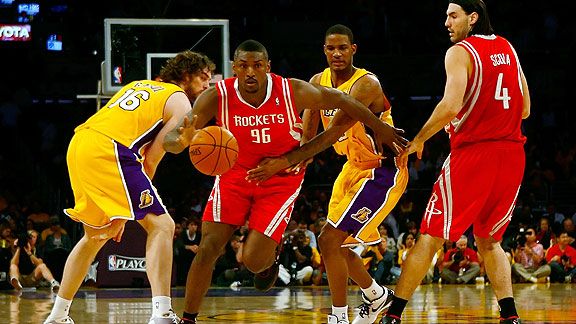Yes? Like the majority of Laker fans, I really liked Trevor Ariza. In his previous five NBA seasons of virtual anonymity, Ariza never seemed to fit into the chemistry with his teams. Chalk it up to inexperience or the adjustment from college to the pros. Enter the 2008-9 season, and Ariza blossoms, playing in every regular season game, and averaging nearly nine points, four rebounds, and two steals in every one of them. Come the playoffs and he’s easily the most integral player outside of Kobe Bryant and Pau Gasol, providing consistently strong defense and clutch steals. While the numbers mentioned above may not “wow” anybody, remember that Ariza has always been considered an average player, and that last season could be considered his breakout year. Is it all that strange that he should ask for a multi-year deal at about $6 million a season? No, it’s not, considering his role on a championship team, but in this market you can’t fool yourself into thinking the already penny-pinching Lakers will bite.
Perhaps large-market teams are getting smarter, refusing to award talent with big contracts after one successful season. Prior to last season, Ariza hadn’t made much of an impression in the NBA, and then out of nowhere he’s starting in the NBA Finals. And where did that shot come from? Given the economic climate, I think it would’ve been a wise decision to give Ariza a one-year deal, worth a little more than what he was making the previous season. If he could then replicate his success, then by all means, secure the guy for the next few seasons. But this didn’t happen, and maybe this is to the fault of Ariza’s agent, David Lee, who seemed to attack the Lakers from the onset. While Ariza was valuable to the Lakers, value is measured in worth. There’s an old story about a woman who unknowingly bought a Van Gogh at a garage sale. She used it as a window shade and it became all faded from the sun. She even cut off a piece of the painting to make it fit. When it became obvious what she had, all these experts came to investigate. When they asked her why she had cut the painting she responded, “It was just a little piece of the sky.” (Thanks to Tom Waits for the anecdote.) Value is obviously subjective, and obviously Ariza wasn’t as valuable to the Lakers as he thought. He was a piece to their championship puzzle, but one that was apparently replaceable in the mind of Lakers GM Mitch Kupchak. The Rockets, however, saw much worth in Ariza, to the tune of five years and $33 million.
It comes down to math really, in a crazy algorithm that involves money, the length of the contract, the player’s age, their agent’s delusion, and talent. It’s enough to make one frustrated, and sometimes you wish these negotiations weren’t made public. In the end, Artest did the Lakers a huge solid. Like Ariza, he’ll be making roughly $6 million a season. However, Artest only signed for three years, and as a player about to turn 30, that’s all he should get playing for the Lakers.
So, what it comes down to is this: is three years of Artest leaving his prime better for the Lakers worth more than having Ariza for five years while he is just entering his? The answer to that question is “yes.” For the next three years Artest will put up better offensive numbers and play a bit better defensively than Ariza. This makes sense to me since the Lakers will be paying a better player just as much as they would have had to pay Ariza.
Those in support of keeping Ariza will say his willingness to quietly wait in the wings and commitment to team-play were worth his price tag. But when have the Lakers ever been about being a team? The Lakers are a team in theory, but the offense obviously runs through Kobe and it will continue to be that way as long as he is in the purple and gold. Last season, with Kobe, Lamar Odom, Pau Gasol, and Andrew Bynum all on the roster, the Lakers were possibly the most star-studded team in the league. At the beginning of the season, Odom immediately expressed frustration with having to come off the bench, a sure sign of a bloated ego and unwillingness to change for his team. Over time, he took on his diminished role as it became clear that the team was winning with coach Phil Jackson’s new plan. This is the same mold Artest will have to fit into. The Lakers are becoming a team of aging stars (Kobe, Odom, Artest) amid unproven talent (Farmar, Bynum). The older players are exiting their prime and the Lakers’ championship window is closing. Artest, the better player, was thought to increase their chances of winning titles within this period of time more so than Ariza. Case closed.
As for those who think Artest is a team cancer who will cause problems behind the scenes, I wouldn’t worry. At this point in his career, it appears to be all about the championship. Still, if he ever brushes off Phil, or especially if he gets into it with Kobe, L.A. will eat him alive. He knows better, but if it turns out he doesn’t, we always have Josh Powell!

